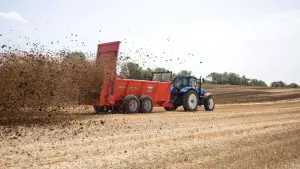Two Nebraska Farmers Spread Enthusiasm for KUHN Apron Box Manure Spreaders

The value of manure as a nutrient-rich resource has gained momentum in recent years. Farmers on organic operations have long been dependent on this byproduct – traditionally labeled “waste” – as a primary supplement for soil nutrition. But now in a time of inflated fertilizer prices, more conventional producers are looking to manure as a cost-effective means of replenishing their fields. For two operators in the North Platte, Nebraska, area, KUHN apron box manure spreaders are the ideal choice for taking maximum advantage of manure’s nutrient value.
Charley Brown manages Pearman Farms, a row crop operation with significant segments of organic corn and organic soybeans. As need for manure spreading on the farm grew, Charley found it was going to be most efficient to own a machine. He started with a KUHN Knight PS 270 ProSpread® apron box manure spreader and has since upgraded to the PS 280 model. Both are high-capacity, non-commercial units that Charley has utilized to spread mainly cattle manure, as well as some compost. When asked about the deciding factor for purchasing the spreaders, he says, “It was the size and the fact we can spread whenever we want.” The PS 270 offers 690 cubic feet of heaped capacity, and the PS 280 offers 800 cubic feet.
Charley praises the performance of the KUHN apron box manure spreaders, saying, “the flow and spread pattern are great.” This is a result of a dual-apron design with a two-piece poly floor and optimized beater location. Charley also makes use of a scale system on his current spreader. “Our old machine did not have one. The PS 280 does, and I use it for better precision.” He says time savings and efficiency are the biggest ways his operation has benefitted from running the spreaders.
In addition to managing Pearman Farms, Charley also does a lot of custom work for other area farmers, including manure spreading and combining. It was during one of these jobs that he met Mike Henry, who runs a cow-calf operation southeast of North Platte, which he purchased from his father to become third-generation owner. Mike describes the farm as family oriented, with his wife serving as co-owner-operator and their children playing active roles. The Henry’s stay busy not only with about 1,000 head of cattle but with around 1,200 acres of crops, including alfalfa, corn and soybeans.
Over the years, Mike has relied more and more on manure for nutrient management in his fields. “Back then, manure was a waste product; now we’re not just spreading manure to get rid of it.” In the face of drastically increased fertilizer prices, he says it’s actually more cost effective to import manure and apply it in addition to what is generated by his feedlot. “I benefit most on the potassium side with this sandy soil.” He also sees better value importing manure for nitrogen and phosphorus needs.
Mike’s first experience with KUHN spreaders was a hydraulic push model, which he loved. As he started doing some of his own custom spreading work and teamed up with Charley for some jobs, he decided to get a similar machine with increased capacity and chose a PS 270.
“We switched over because we decided to go with something a little larger. It holds a semi load.” Mike is also incredibly impressed by his machine, particularly the durability and evenness of spread, as well as the vertical beater module he has equipped. “You can put most people in the tractor with it, and they can do a good job spreading. It matters a lot to us because we focus more on the nutrients and need an even spread.”
KUHN apron box manure spreaders are built to last with all-steel, welded construction that provides a backbone and solid framework. These spreaders are designed for simplicity, from the high-density, two-piece poly floor that provides impact resistance to the 667 XH pintle apron chains with heavy-duty, self-cleaning sprocket. Mike notes, “We are sitting at a little under 10 cents a ton for upkeep.”
“We need to tear particle size down for alfalfa fields,” Mike says, coming back to machine performance. Both the PS 270 and 280 feature heavy-duty VertiSpread® vertical beaters, equipped with 5/8 inch flighting and hardened steel beater tips. This results in a wider spread pattern and more consistent material breakup. Mike adds, “There are lots of vertical beaters in the industry, but KUHN has one of the best on the market.”
Charley and Mike are seeing big demand locally for custom spreading, and both say they already have too much spreading of their own to get done. Mike is hoping one of his sons will take over some of the work, but he’s also recommending KUHN spreaders to his neighbors who are interested in getting their own machines. “I’ve told them they are durable and built to last.” Along with durability, he talks up the very low cost of operation and the vertical beaters for doing such a good job. Charley says he would also recommend KUHN equipment to fellow producers. In addition to his spreader, he runs a KUHN Krause Landstar® soil finisher.
There’s no telling what traditional fertilizer prices will be tomorrow, but the manure produced by livestock will continue to offer nutrient value for operators equipped to utilize it effectively. In Lincoln County, Neb., and beyond, enthusiasm for KUHN apron box manure spreaders is spreading, and helping to spread the good word for manure management!
